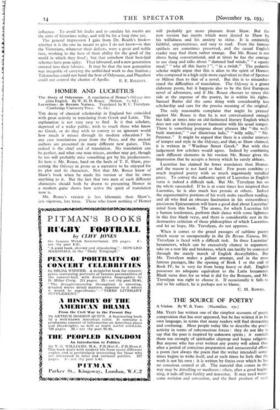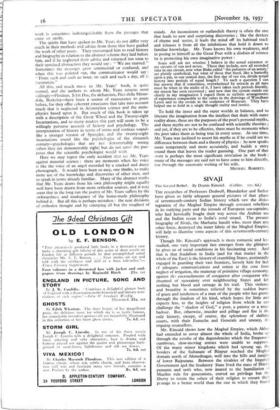THE SOURCE OF POETRY A Vision. By W. B. Yeats.
(Macmillan. iss.) Mx. YEATS has written one of the simplest accounts of poetic composition that has ever appeared, but he has written it in his own language, in terms that many readers will find distracting and confusing. Most people today like to describe the poet's activity in terms of subconscious forces : they do not like to say that the poet is inspired by-unknown spirits ; it reminds them too strongly of spiritualist claptrap and bogus religions. But anyone who has-ever written any poetry will admit that, after a period of conscious preparation and unsuccessful effort, a poem (not always the poem that the .writer intended) some- times begins to write itself, and at such times he feels that the work is not his own : it is written by-forces over which he has no conscious control at all. The material that comes in this way may be drivelling or mediocre : often, after a good begin- ning, it tails off into futility and lionsense. It may need weari- some revision and correction, and the final product of such
work is sometimes indistinguishable from the passages that came so easily.
The spirits that have spoken to Mr. Yeats do not differ very much in their methods and advice from those that have guided the work of other poets. They encouraged him to read history and biography in relation to the abstract scheme they laid before him, and if he neglected their advice and returned too soon to their unmixed abstraction they would say : " We are starved." Sometimes the messages grew sentimental or confused, and when this was pointed out, the communicator would say : From such and such an hour, on such and such a day, all is frustration."
All this, and much moie in Mr. Yeats' book, is quite normal, and the authors to whom Mr. Yeats returns most willingly—Plotinus, John Dee, the alchemists, Pico della Miran- dola, Berkeley—have been a source of reassurance to poets before, for they offer coherent structures that take into account much that is neglected in Aristotelian science and the meta- physics based upon it. But much of this book is taken up with a description of the Great Wheel and the Twenty-eight Incarnations, and to many readers this part will seem to be a willingly perverse account of history and psychology. The interpretation of history in terms of cones and vortices sounds like a stranger version of Spengler, and the twenty-eight incarnations sound like the psychologies of the sixteenth century—psychologies that are not demonstrably wrong (often they are demonstrably right) but do not serve the pur- poses that the scientific psychologist would wish.
Here we may regret the early accident that set Mr. Yeats against material science : there are moments when his voice is like the voice of an angel recorded by a cracked and dusty phonograph. It would have been so easy, one thinks, to make more use of the knowledge and discoveries of other men, and to speak in terms already familiar. Many of the abstract truths that Mr. Yeats draws from his own philosophy might equally well have been drawn from more orthodox sources, and it may seem that in the long run the poetry of Mr. Yeats suffers by the awkwardness and inadequacy of the home-made philosophy behind it. But all this is perhaps mistaken : the neat divisions of orthodox thought end by cramping all but the toughest of minds. An inconsistent or outlandish theory is often the one that leads to new and surprising discoveries ; like the devices of rhyme and metre, it leads the mind off its habitual track and releases it from all the inhibitions that hold it down to familiar knowledge. Mr. Yeats knows his own weakness, and in posing to himself as the Great Poet with a disdain of science he is protecting his own imaginative- power :
Some will ask me whether I believe in the actual existence of my circuits of sun and moon. Those that include, now all recorded time in one circuit, now what Blake called the pulsaters of an artery,' are plainly symbolical, but what of those that fixed, like a butterfly upon a pin, to our central date, the first day of our era, divide actual history into periods of equal length ? To such a question I can but answer that if sometimes, overwhelmed by miracle as all men must be when in the midst of it, I have taken such periods literally, my reason has soon recovered ; and now that the system stands out clearly in my imagination I regard them as stylistic arrangements of experience comparable to the cubes in the drawings of Wyndham Lewis and to the ovoids in the sculpture of Brancusi. They have helped me to hold in a single thought reality and justice.
To hold the inner and the outer worlds in balance, and to liberate the imagination from the intellect that deals with outer reality alone, these are the purposes of the poet's personal myths, and these myths are not to be confused with scientific theories ; and yet, if they are to be effective, there must be moments when the poet takes them as being true in every sense. At one time, Mr. Yeats was inclined to assert his myths as if he could see no difference between them and a theory of physics : he now speaks more temperately and more accurately, and builds a story
round them that leaves the reader guessing. One part of that story is perhaps the most significant revelation in the book :
many of the messages are said not to have come to him directly, but through the automatic writing of his wife.
MICHAEL ROBERTS.

















































































































 Previous page
Previous page